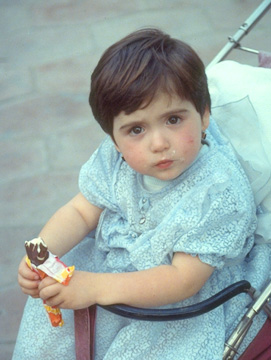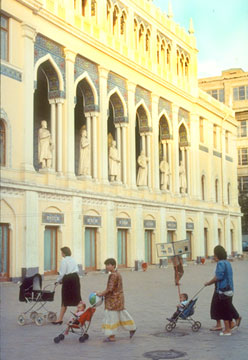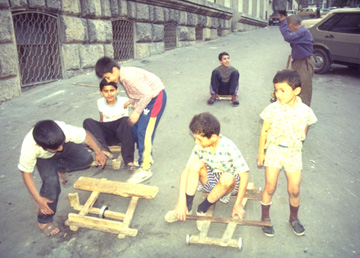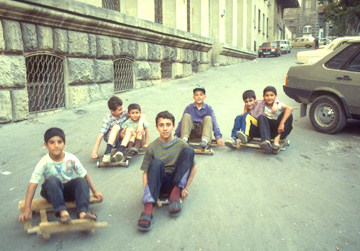|

Autumn 1995 (3.3)
Pages 8-11
Baku Diary
Leisure
and Play - Continents Apart
by Susan Cornnell
  "Thirty-six times hath the shadow
of the nightingale fallen across the full moon." That's
Azeri for saying, "Three years have flown by". And
in these three years since I first arrived in Baku, I've often
had to make an incredible leap in my journey between two cultures-Azerbaijani
and American. "Thirty-six times hath the shadow
of the nightingale fallen across the full moon." That's
Azeri for saying, "Three years have flown by". And
in these three years since I first arrived in Baku, I've often
had to make an incredible leap in my journey between two cultures-Azerbaijani
and American.
I'm back in the United States now. I've returned to further my
education. I'd have to admit that there are times when I feel
a bit awkward as I readjust to my very own culture. I guess it
shows how much I absorbed from Azerbaijanis, even subconsciously.
Down at the Beach
The other day, I decided
to take three kids to the beach. That sounded like fun. But I
had forgotten what it was like here in the U.S. It took a couple
of hours just to pack. There was the ice cooler filled with cold
beverages, sandwiches all prepared and stashed neatly in individual
Zip-loc plastic bags, beach toys, sunglasses, sandals, suntan
lotions with so many possible formulas of sun screen that my
head started to spin in confusion. Didn't want to forget the
beach towels and umbrellas. The list went on and on. Being adventurous,
I decided to take a toddler along. That meant a diaper bag stuffed
with disposable diapers, baby stroller, baby food and sterilized
disposal bottles. I was exhausted before I even backed the car
out of the driveway.
The last time I went to the beach in Azerbaijan, my host family
brought along a thermos of hot tea, a few hard boiled eggs, some
fresh tomatoes and cucumbers and, of course, that omnipresent
"staff of life"-a round loaf of whole wheat bread.
Their family had three kids as well, but it seemed the only thing
the children needed to keep themselves amused was sunshine and
sand. No toys to drag along. We got sunburned-well, I did, anyway.
We munched corn-on-the cob sold by an entrepreneur who had roasted
them on his little charcoal stand.
There were other differences, too. No single-engine planes circled
overhead trailing banners behind advertising, "Surf 'n Turf
for $9.95 at Cap'n Bob's". Nor, should I add, were there
the conveniences of toilets or the safety precautions of beach
patrols that we often take for granted. Other than that, it was
the same sand and same sun, simply continents and cultures apart.
  Omnipresent TV Omnipresent TV
It goes without saying that
in most U.S. homes, TV is pervasive. Perhaps "invasive"
is a better word. For many of us, television has become an additional
member of the family, especially since it offers remote control
and TV guides and cable with 55 channels. We plan our schedules
according to what happens to be playing on TV. We talk about
previous shows and upcoming movies.
Every Azerbaijani home I've ever visited also has had a TV. VCRs
are fairly rare although there are a few video shops starting
to open. And more and more, you do see satellite dishes poised
on narrow balconies above the streets.
Left: Nizami Museum
The new invasion in Azerbaijan is via TV programming from the
West. Baku has four channels, two in Azeri, one in Russian (produced
in Moscow) and another in Turkish (produced in Istanbul). The
Azeri Channel is usually the least entertaining-there are still
a lot of "talking heads" and "empty time"
filled with nostalgic scenes and rustic countryside or close-ups
of beautiful, bright-colored flowers with romantic or mugham
music playing in the background.
The concept of advertising on
television, or any place else for that matter, is still relatively
new. Sometimes a sign, "advertisement goes here" flashes
across the TV screen and everybody waits a bit until the regular
programming continues. But, in general, people don't pay too
much attention to Azeri TV except to make sure they know what
the political leaders are saying.
Below: Boys play with carts they've made themselves from
scrap wood and ball bearings (June 1995).
But send over the American-produced
"Santa Barbara" soap opera and the British Super Channel;
everyone becomes "glued" to the screen. Housewives
were ecstatic when they learned that "Santa Barbara"
reruns would be playing for seven more years!

Movies
Then there's the movies.
Back in Pennsylvania, I went to see "Apollo 13" at
the local cineplex. The selections were overwhelming-10 cinemas,
all spotlessly clean, with a choice of candy store, pizza parlor,
video game parlor and refreshment stand.

In Baku, "kinos" (cinemas) are like tea houses ("chai
khanas"), which means they're still predominately male domain.
Since there's no popcorn, everybody puffs away on cigarettes
during the movie. A lot of continental Indian movies are shown.
Many of them follow the formulaic plot-the dilemma of poor boy
who falls in love with beautiful rich girl whose parents are
violently opposed to the relationship. From America, actors like
Schwarzenneger and Stallone import Hollywood's sophisticated
"special effects" and popularize violence instead of
reason.
Necessity of Equipment
for Playing
We Americans thrive
on leisure as much as on work. We work hard and believe that
gives us the excuse to play hard, too. But most of us depend
upon a lot of gadgets and equipment whenever we play. There are
gyms, balls in all sizes from golf to basketball, golf carts
and clubs, skis, surfboards, skateboards, cameras, a wide variety
of recreational vehicles from three wheelers to four-wheel drives.
Not to mention all the clothing gear and specialized shoes for
our athletic endeavors.
We seem to have this incredible urge to possess stuff, especially
the latest equipment with all its advances and improvements.
That makes us spend an inordinate amount of time just figuring
out how it works, which in turn eats up the time that we're supposed
to be spending enjoying our leisure.
And as for the kids, take a look inside their rooms. You'll find
dozens of dolls, stuffed toys, cars, trucks, guns, books, crayons,
and stacks of video games. In Baku, you could open your own toy
store with all that.
Neither kids nor grown-ups have many toys in Azerbaijan. In fact,
most families still can't even afford cars. Kids improvise their
toys from a few pieces of wood and some string. My neighbor's
kids used to play store for hours with old empty containers and
food boxes. Toys and games in Azerbaijan are still mostly powered
by imagination instead of batteries.
As I look back on my time in Baku, my happiest moments revolved
around those times that we spent just sitting and talking and
sharing a cup of tea or a simple meal with a few friends. There
was no need for all these contrivances and conveniences. Folks
love to take it easy, strolling along the Boulevard in the late
afternoon or early evening with family members and friends. It
seems everyone is eager to receive guests or, likewise, to accept
invitations to be guests themselves. Personal relations are highly
nurtured.
A big night out on the town on a hot summer night might be a
ride on the Ferris wheel that provides a spectacular view of
the city and the Caspian (it goes around so slowly you can hardly
tell you're moving except for the creaky motor). A special treat
of ice cream, bought at one of the sidewalk stands, tops off
the evening.
Birthdays
Kids are greatly revered
in Baku. They rarely do any work. They're continuously hugged
and kissed by everyone who happens to be in close proximity (both
friend and stranger alike). And so birthdays are excuses for
moms, aunties, sisters and grandmoms to busy themselves with
cooking prodigious amounts of food non-stop 24 hours before the
event because every known living relative is likely to appear
at the door. Everybody joins in. All generations mingle for a
party that will probably last all day and night. Dads, granddads
and uncles always keep the party lively with rounds and rounds
of toasts.
Curiously, Azerbaijanis have a practice about birthday gifts
that I find quite considerate. If gifts are brought, they are
graciously taken into another room for the honoree to open in
private after the guests have left. Care is taken never to embarrass
a giver who might have brought something less grand than the
next person. Despite this, there's a tendency to be quite generous
in gift-giving, usually much more than we are.
And all this bustle and activity for a two-year-old Samir, who
isn't quite sure what the fuss is all about, but who will dance
up a storm when Auntie Irada plays the piano and Uncle Fuad strums
his saz (one of Azerbaijan's traditional musical instruments).
On the other hand, kids' birthdays in America are quite different.
Often the parties are not held at home these days (who wants
the preparation, the noise and the mess to cleanup!) Parties
last a predictable two hours. Guests receive written invitations
specially designed for the occasion and which match the theme
or color scheme of the party. Attendees are mostly neighborhood
kids or school friends, although a few relatives may come if
they live nearby.
Parties are usually theme-centered, totally based on the latest
fads, usually driven by the movie industry. I've recently been
invited to cowboy parties, "Lion King" and "Aladdin"
parties, and even special Pizza Hut and McDonald's birthday parties.
There are often matching disposable paper plates, napkins, and
hats. At many parties, souvenirs are given to the guests.
Entertainment at American birthday parties is organized. For
the young kids, there are traditional games like "Pin the
Tail on the Donkey" with prizes for winners. If the party
is held outdoors, there may be water pistols and even pony rides.
Of course, there's always the cake, lit with candles (one for
each year) which signals for everyone to burst into song, "Happy
Birthday!" Candles are blown out, after which everybody
stuffs their faces with cake, icing and ice cream.
Then comes the highlight of the party, "gift-opening time".
Parents feel immense pressure not to embarrass their own child
in the choice of gift and the amount of money spent, as the gift
will be thoroughly scrutinized by all guests. Each gift is wrapped
in speciality wrapping paper, accompanied by a card naming the
benefactor. As each gift is opened, the recipient is dutifully
thanked, the gift quickly passed around for everyone's scrutiny,
while the paper is already being ripped off the next package.
Going to Concerts
Attending the Symphony
in both cultures can be quite different, too. In U.S. cities,
especially those along the East Coast, the musical event is highly
anticipated. As tickets are expensive, the events are mostly
supported by wealthy patrons. Students usually have to arrive
an hour earlier if they want to purchase discounted tickets.
During the entire performance, the audience sits silently and
absorbed. (Don't think you can take a squirmy kid along unless
you want to have a nervous breakdown!) At one concert hall I
know, they give away free breath mints with noiseless wrappers.
A sign above the candy container warns that disturbances of any
kind in the Hall, including telephone beepers, is not permissible.
At the end of the performance, after enthusiastic applause and
an encore or two, concert goers file out, and the musicians disappear
backstage.
In Baku, the National Symphony Orchestra performances are affordable
for everyone, although these days the house is rarely packed.
Kids move as freely about the hall as the musicians before and
after the concert. And during the concert, people think nothing
of talking with each other as if the Symphony were background
music for their conversation. It's rare for anyone to hush them.
After a stunning performance, well wishers, friends and relatives
rush up to the stage and present bouquets of flowers-usually
red carnations (and always an odd number for good luck). I've
even seen the presentation take place mid-performance.
Concerts are a warm, friendly experience. They provide a chance
for friends to visit and, consequently, in addition to the fine
performances you can hear in Baku, you feel part of one great
big family.
Appreciating Both Cultures
I love both my countries.
I love the freedom to express myself in speech and the availability
of clothes in the U.S. But I treasure the absence of offensive
literature, violent TV, and provocative dress in Azerbaijan.
I love the endless options for living arrangements in the U.S.
as there are so many attractive, affordable place to set up house.
But I love my tiny, two-room flat in Baku. There are times when
I appreciate my anonymity in the U.S. while at the same time,
loving how tightly knit everyone feels in Baku and even how everyone
knows everybody else's business. I love driving a car in Philadelphia.
I love walking in Baku.
In many respects, Azerbaijan and America are two different worlds,
sometimes they seem light years apart, yet, I'd have to admit,
I consider both "home". This experience of living in
Baku these past three years has taught me to be more tolerant,
patient and appreciative. It has expanded my mind and heart.
I'm quite a different person than I was three years ago. Besides
the incredible rich experiences I enjoyed there, my repertoire
of fascinating stories has expanded-fond memories that I look
forward to sharing with friends from all over the globe as we
sit around the kitchen table, sipping electric-percolated coffee.
Susan Cornnell's "Baku Diary" has been a regular
feature in our magazine since September 1993. She has just returned
to the States after living three years in Azerbaijan.
From
Azerbaijan
International
(3.3) Autumn Issue.
© Azerbaijan International 1995. All rights reserved.
Back
to Index AI 3.3 (Autumn 1995)
AI Home Page
| Magazine
Choice
| Topics
| Store
| Contact
us
|




